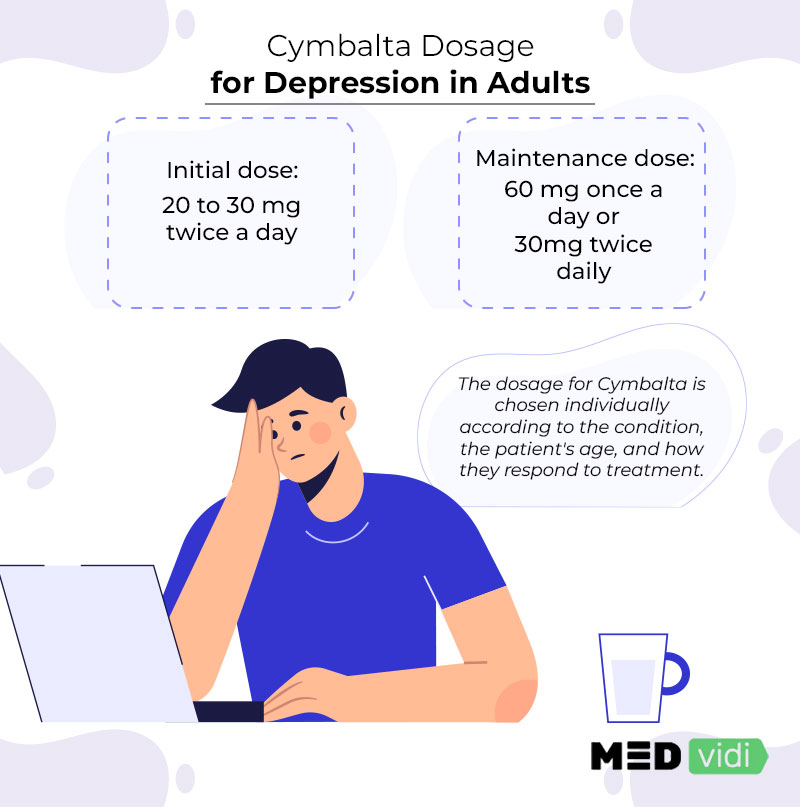Depression can be debilitating, with most symptoms limiting a person’s productivity and affecting the usual way of living. Fortunately, for most patients, the condition is treatable. Therapy, antidepressants, or the combination of these approaches can be used to help one achieve symptom relief.
Medications are usually prescribed to patients with moderate to severe symptoms. There are different drugs available, and using Cymbalta for depression treatment is one of the most effective and common options.
Read on to know more about Cymbalta, how it works, and what you should be aware of in terms of its side effects.
Contact a prescriber at the MEDvidi online clinic to get a medication chosen right for you.
What Is Cymbalta?
Cymbalta’s generic name is
Unlike some other drugs that act on the nervous system, duloxetine is not a controlled substance and does not come with the risk of habit-forming. It is, however, available only by prescription.
While the drug has
What Is Cymbalta Used for?
Cymbalta is approved for several conditions? Including the following:
- Major depressive disorder (MDD) in adults;
- Generalized anxiety disorder (
GAD[3] ) in adults and children aged seven years and above; - Different kinds of
chronic pain[4] in adults (nerve pain caused by diabetic neuropathy and chronic joint or muscle pain); Fibromyalgia[5] (a chronic pain disorder) in adults and children aged 13 years and above.
Summing up, duloxetine works to relieve chronic pain, decrease nervousness, and improve your sleep, appetite, energy levels, and mood.
Cymbalta Dosage
The dosage for Cymbalta
The dosages can be different for the treatment of fibromyalgia, generalized anxiety disorder, neuropathic pain and chronic pain.
The usual Cymbalta dosage for depression in adults is:
- An initial dose of 20 to 30 mg is taken orally twice a day.
- A usual maintenance dosage of 60 mg is taken once a day, or 30mg is taken twice daily.
The maximum Cymbalta dose for depression is 120 mg per day.
The drug is taken orally with or without food. Though for those who have nausea, it helps to take it with food.
The dosage of Cymbalta is chosen individually. Consult a professional to get diagnosed with depression online.
Cymbalta Side Effects
Most of the side effects of Cymbalta are mild to moderate, and most patients do not experience serious ones. Some common symptoms include:
- Nausea
- Drowsiness
- Increased sweating
- Loss of appetite
- Dry mouth
- Constipation
- Fatigue
Patients should alert their doctor in case they experience any of the following serious side effects:
- Confusion
- Bruising or bleeding easily
- Loss of sexual interest/changes in their sexual ability
- Muscle fatigue, cramps
- Liver problems (unending nausea, yellowing eyes, dark urine, abdominal pains)
- Difficulty in urinating
- Tremors
- Fluttering in the chest or pounding heartbeats
- Manic episodes
Cymbalta has a low risk of allergic reactions. However, it is not excluded. One should alert his doctor immediately if he/she notices the following symptoms:
- Skin rash or skin pain
- Hives
- Swelling in the face or throat
- Sore throat
- Burning eyes
- Mouth sores
- Difficulty breathing
MEDvidi doctors offer comprehensive support. Your treatment plan will be modified if you experience side effects or the medication is not working.

Withdrawal Risks and Symptoms
Patients should not stop taking duloxetine suddenly or without following guidance from their doctor. It exposes one to a risk of uncomfortable and sometimes limiting side effects. These could set in within hours of stopping your antidepressant use.
So, if the medication is not working for the patient, or they cannot tolerate the side effects, or another health complication has emerged, the doctor will provide the right guidelines for discontinuation of the drug. Usually, this is through tapering off, where the patient takes smaller doses gradually, allowing the body to adjust to the changes.
When it comes to Cymbalta, withdrawal symptoms may include:
- Insomnia
- Sweating
- Anxiety
- Dizziness
- Nausea
- Irritability
- Headaches
- Vomiting
- Diarrhea
- Prickling skin sensation
Conclusion
Cymbalta is an effective medication for depression in adults. It is also approved for treating other conditions, including GAD, fibromyalgia, and chronic pain. The drug belongs to the SNRIs class of antidepressants and is an effective option for most patients. However, patients should get instructions for use from their doctors and follow the prescribed dosage. They should inform their doctor of any side effects and their severity. Patients should also avoid stopping Cymbalta suddenly to prevent withdrawal symptoms.
Also, one should notify the prescriber about the degree of improvement within the first four to six weeks to determine whether to continue, discontinue the drug, or increase the dosage. To get comprehensive guidance on medication treatment for depression, contact MEDvidi today!













